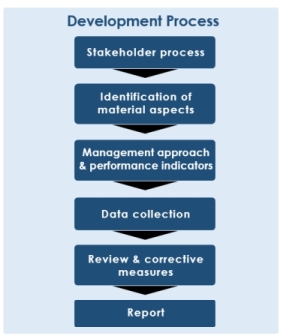Transparency & Disclosure with CONNEXIS
More and more companies and organizations report pro-actively on their sustainable development contributions and performance, either within annual reports or in dedicated CSR, ESG reports.
In addition, new Swiss (OR 964) and EU (CSRD) regulations oblige many companies to start reporting on their sustainability.
Pro-active ESG Reporting
Pro-active reporting on sustainability helps companies to
- Communicate directly with internal & external stakeholders
- Identify & set measurable ESG targets
- Measure their progress & performance against these targets
- Manage & control change within their organizations
- Make their entire business model more sustainable.
At the same time, internal & external stakeholders appreciate pro-active reporting on sustainability in combination with the adherence to established international standards and best practices, because it makes
- Complex information more accessible
- Corporate ESG performance comparable within the peer group.
New Swiss Non-Financial Reporting Regulation OR 964
The new Swiss regulation OR 964 obliges all Swiss companies that meet the following three criteria to publish non-financial reports
- Companies of public interest: FINMA regulated financial institutions, SIX-listed Swiss companies & Swiss issuers of corporate bonds
- Companies with more than 500 full time employees (incl. all subsidiaries)
- Companies with more than CHF 20 million in total assets or sales of over CHF 40 million
These companies have to report on their environmental, social, workers' and human rights concerns, as well as on the fight against corruption. In addition, companies must take corrective actions for material non-financial risks.
The non-financial reporting obligation starts with the 2024 reports, i.e. the reporting period 2023.
In order to comply with the new regulation, companies are encouraged to follow generally accepted standards (e.g. GRI).
Non-compliance with OR 964 can have personal legal consequences for board members of the affected companies.
New EU Corporate Sustainability Reporting Directive (CSRD)
The new EU CSRD obliges all large EU companies to report their ESG performance from 2026 (reporting period 2025) within their annual report. The CSRD defines large companies as companies with
- more than 250 employees
- more than EUR 25 million in total assets
- EUR 50 million in sales
Companies that meet two of the three above criteria fall under the CSRD obligation.
In the EU, around 50,000 companies will be directly affected by the CSRD, around 15,000 companies in Germany alone.
In addition, many SME suppliers of large companies will be indirectly affected by the CSRD, if their supplies fall within the material aspects of the large companies.
As a consequence, it is expected that most EU companies with B2B relations will be affected directly or indirectly by the CSRD.
The ESG reports will have to meet the requirements of the European Sustainability Reporting Standards (ESRS) and have to be verified by external auditors.
In order to prepare the new ESG reports under CSRD, large EU companies have to
- Identify/define material data in 2024, double materiality analysis
- Establish appropriate data collection structures & quality in 2024
- Collect all data deemed material starting January 1st 2025
It is expected that large companies will have to collect and report over 1,000 data points in 82 categories to comply with the CSRD.
CONNEXIS offers its customers a well structured approach to comply with CSRD.
Benefits of Standardized Reporting
Internationally agreed disclosures and metrics make sustainability reports more accessible and more comparable, providing stakeholders with enhanced information. Organizations can of course report their sustainability performance according to their own preferences and needs. However, following international standards of sustaibility reporting (such as e.g. the Global Reporting Initiative) brings several advantages:
- Improved SRI1, CDP2 and DJSI3 rating
- Higher acceptance from financial markets
- Protected reputation with consumers and customers
- Enhanced credibility with the wider public and in-house staff
The Global Reporting Initiative (GRI) - Materiality Analysis
Sustainability reporting helps organizations to
- Set goals
- Measure performance and
- Manage change
In this context the Global Reporting Initiative (GRI) developed its set of GRI Sustainability Reporting Standards.
The purpose of these standars is to help reporting organizations prepare sustainability reports that
- Matter to their stakeholders
- Contain valuable information about the most relevant CSR topics (Materiality Analysis)
- Make such sustainability reporting standard practice.
Structured Development Process
Based on many years of project experience CONNEXIS has developed a structured process for the production of sustainability reports.

CONNEXIS Integrated Reporting (IR)
An integrated report is a concise communication about how an organization’s strategy, governance, performance and prospects, in the context of its external environment, lead to the creation of value in the short, medium and long term.
With CONNEXIS, Integrated Reporting is not about writing a report; it is the process by which organizations identify their risks related to important issues, like human rights, the environment, labor and other social issues. CONNEXIS works with customers to truly integrate <IR> into their processes throughout their entire organization. As a result, we enable our customers to convert reporting from a pure cost factor into a highly useful tool for organizational and strategic development.
With CONNEXIS <IR> becomes a strategic exercise for companies to better understand where they are and what trends, issues and topics are strategically important to them, in the short, medium and long term.
1…Socially Responsible Investing 2…Carbon Disclosure Project3… Dow Jones Sustainability Index
